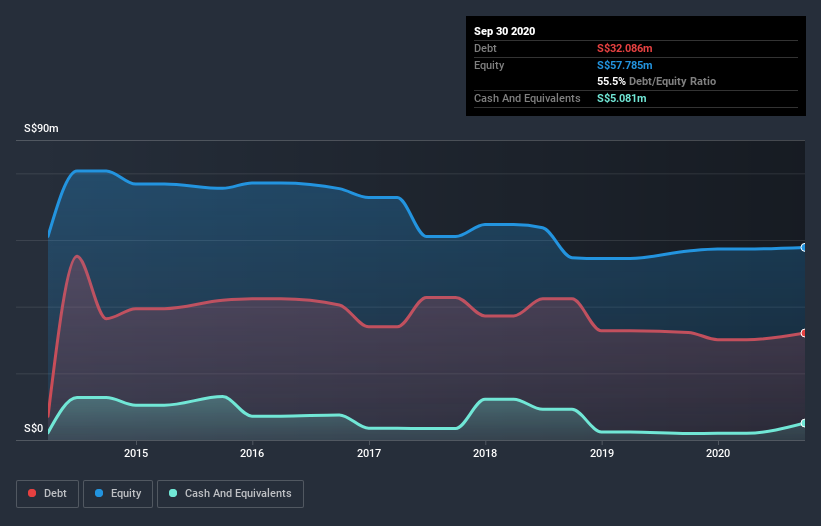Some say volatility, rather than debt, is the best way to think about risk as an investor, but Warren Buffett famously said that 'Volatility is far from synonymous with risk.' It's only natural to consider a company's balance sheet when you examine how risky it is, since debt is often involved when a business collapses. We can see that Casa Holdings Limited (SGX:C04) does use debt in its business. But the more important question is: how much risk is that debt creating?
What Risk Does Debt Bring?
Debt assists a business until the business has trouble paying it off, either with new capital or with free cash flow. If things get really bad, the lenders can take control of the business. However, a more frequent (but still costly) occurrence is where a company must issue shares at bargain-basement prices, permanently diluting shareholders, just to shore up its balance sheet. By replacing dilution, though, debt can be an extremely good tool for businesses that need capital to invest in growth at high rates of return. When we examine debt levels, we first consider both cash and debt levels, together.
Check out our latest analysis for Casa Holdings
What Is Casa Holdings's Net Debt?
The chart below, which you can click on for greater detail, shows that Casa Holdings had S$32.1m in debt in September 2020; about the same as the year before. However, it does have S$5.08m in cash offsetting this, leading to net debt of about S$27.0m.

A Look At Casa Holdings' Liabilities
We can see from the most recent balance sheet that Casa Holdings had liabilities of S$5.35m falling due within a year, and liabilities of S$33.6m due beyond that. Offsetting these obligations, it had cash of S$5.08m as well as receivables valued at S$3.28m due within 12 months. So its liabilities total S$30.6m more than the combination of its cash and short-term receivables.
The deficiency here weighs heavily on the S$11.1m company itself, as if a child were struggling under the weight of an enormous back-pack full of books, his sports gear, and a trumpet. So we definitely think shareholders need to watch this one closely. At the end of the day, Casa Holdings would probably need a major re-capitalization if its creditors were to demand repayment. There's no doubt that we learn most about debt from the balance sheet. But it is Casa Holdings's earnings that will influence how the balance sheet holds up in the future. So if you're keen to discover more about its earnings, it might be worth checking out this graph of its long term earnings trend.
Over 12 months, Casa Holdings made a loss at the EBIT level, and saw its revenue drop to S$15m, which is a fall of 21%. That makes us nervous, to say the least.
Caveat Emptor
While Casa Holdings's falling revenue is about as heartwarming as a wet blanket, arguably its earnings before interest and tax (EBIT) loss is even less appealing. Its EBIT loss was a whopping S$1.8m. Combining this information with the significant liabilities we already touched on makes us very hesitant about this stock, to say the least. That said, it is possible that the company will turn its fortunes around. But on the bright side the company actually produced a statutory profit of S$1.5m and free cash flow of S$2.5m. So one might argue that there's still a chance it can get things on the right track. The balance sheet is clearly the area to focus on when you are analysing debt. But ultimately, every company can contain risks that exist outside of the balance sheet. Case in point: We've spotted 7 warning signs for Casa Holdings you should be aware of, and 4 of them can't be ignored.
When all is said and done, sometimes its easier to focus on companies that don't even need debt. Readers can access a list of growth stocks with zero net debt 100% free, right now.
If you’re looking to trade Casa Holdings, open an account with the lowest-cost* platform trusted by professionals, Interactive Brokers. Their clients from over 200 countries and territories trade stocks, options, futures, forex, bonds and funds worldwide from a single integrated account. Promoted
New: AI Stock Screener & Alerts
Our new AI Stock Screener scans the market every day to uncover opportunities.
• Dividend Powerhouses (3%+ Yield)
• Undervalued Small Caps with Insider Buying
• High growth Tech and AI Companies
Or build your own from over 50 metrics.
This article by Simply Wall St is general in nature. It does not constitute a recommendation to buy or sell any stock, and does not take account of your objectives, or your financial situation. We aim to bring you long-term focused analysis driven by fundamental data. Note that our analysis may not factor in the latest price-sensitive company announcements or qualitative material. Simply Wall St has no position in any stocks mentioned.
*Interactive Brokers Rated Lowest Cost Broker by StockBrokers.com Annual Online Review 2020
Have feedback on this article? Concerned about the content? Get in touch with us directly. Alternatively, email editorial-team (at) simplywallst.com.
About SGX:C04
Casa Holdings
An investment holding company, engages in the trading of electrical and electronic home appliances, kitchen and bathroom fixtures, and accessories in Singapore, Malaysia, Morocco, and internationally.
Solid track record with adequate balance sheet.
Market Insights
Community Narratives



